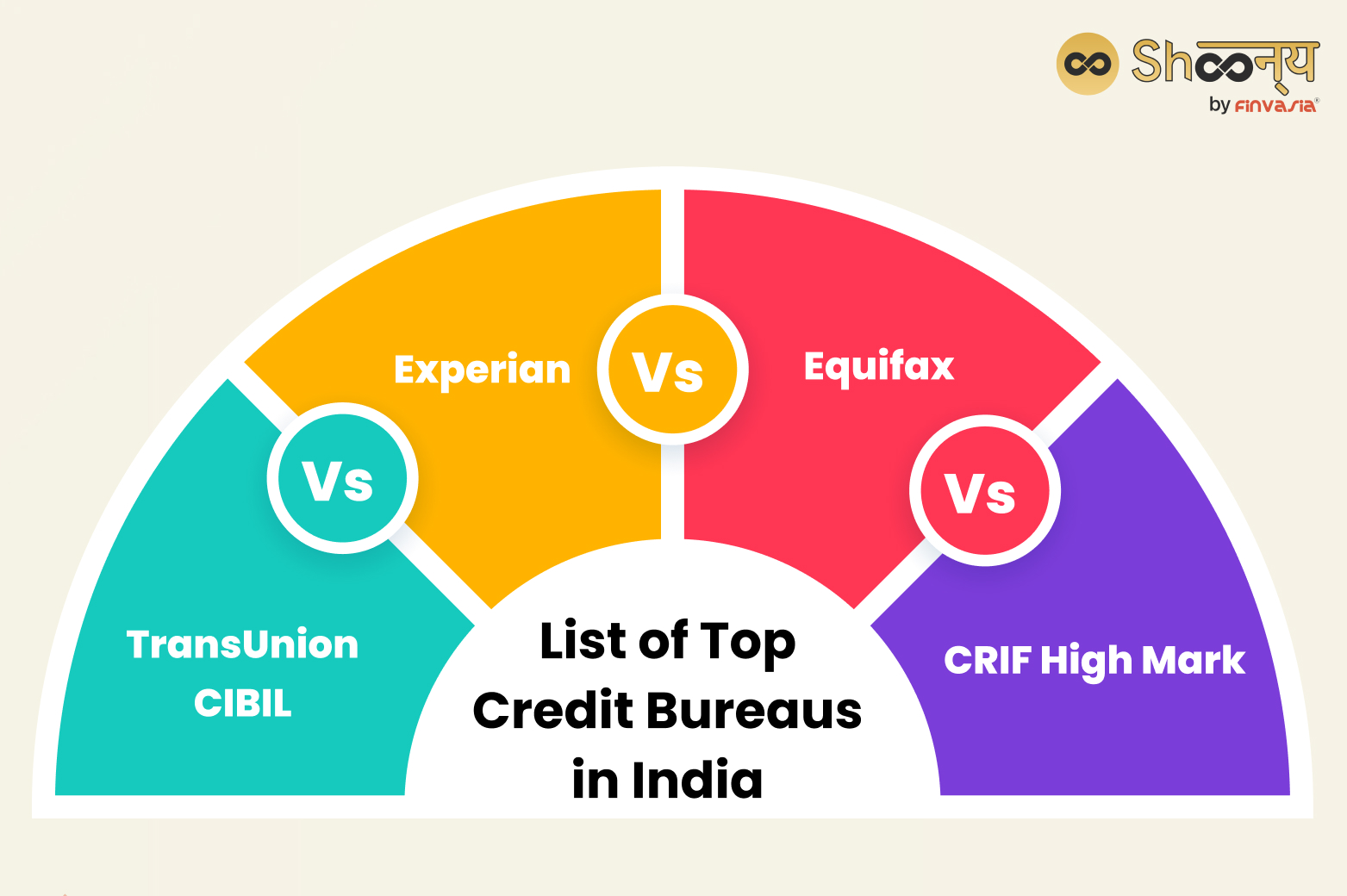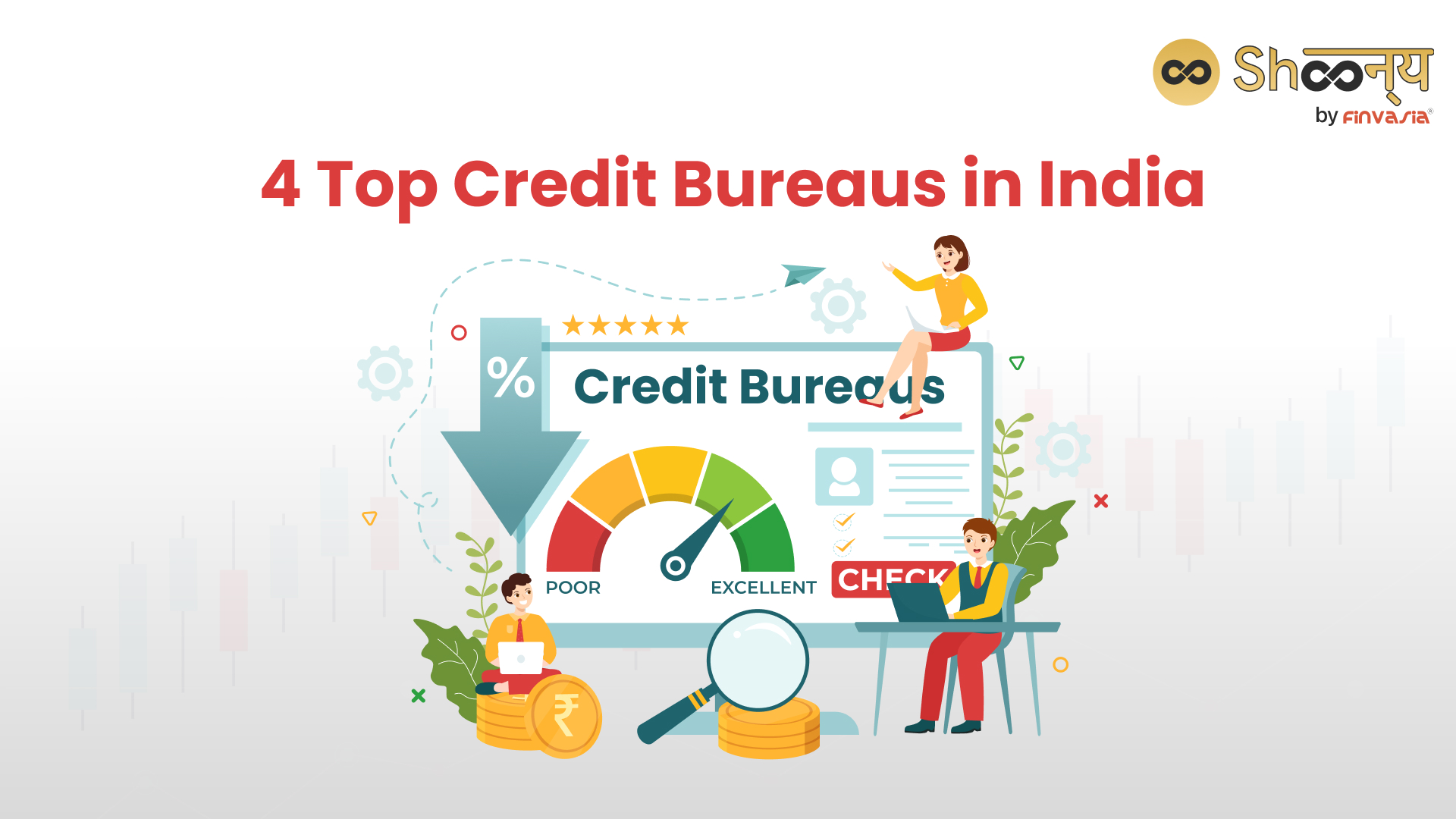When you apply for a car or home loan, the first thing the lender checks is your credit report. Do you know who calculates your credit score and prepares credit reports? Have you heard about credit bureaus in India?
These companies create credit reports. The credit bureaus in India collect and organise data from their members, which include both individual consumers and lenders.
Currently, there are four credit bureaus in India, all licensed by the Reserve Bank of India (RBI).
Let’s explore the list of credit bureaus in India and find out which ones are the top credit bureaus in India.
- What is a Credit Bureau?
- List of Credit Bureaus in India
- Top Credit Bureaus in India| An Overview
- CRIF vs CIBIL vs Experian vs Equifax
- How Do Credit Bureaus in India Work?
- What is a Credit Score?
- CRISIL vs CIBIL: How Do They Differ?
- Credit Rating Agencies in India
- Are Credit Scores from All Credit Information Companies Same?
- How Can You Dispute Credit Report Errors with Credit Bureaus in India
- FAQs | Credit Bureaus in India
What is a Credit Bureau?
When you want to borrow money, the bank or company you’re asking for a loan from checks your credit history. They get this information from a credit bureau that collects and organises details about how you’ve used credit in the past.
These credit bureaus make reports that show your credit history. These reports are used by lenders such as financial individuals, banks, etc., to figure out if you’re trustworthy. The reports also help create credit scores, which are numbers that summarise your credit history. These scores help the lender decide whether you can get a loan or a credit card. They also influence how much money you can borrow and the interest rates.
Lenders use these reports and scores to evaluate the risk and likelihood of timely loan repayment by the borrowers.
Credit bureaus play a significant role in the financial system, as they help to prevent bad loans, fraud, and promote financial inclusion.
In India, there are four credit bureaus or Credit Information Companies (CICs). Each of these credit bureaus has its history, features, and services.
In this blog, we will explore the list of top credit bureaus in India, compare their differences, and understand how they work.
List of Credit Bureaus in India
In India, there are four credit bureaus, namely:
TransUnion CIBIL
Experian
Equifax
CRIF High Mark

Top Credit Bureaus in India| An Overview
The four Credit Information Companies in India are:
TransUnion CIBIL
Established in 1968, it opened its first office in India in 2000.
TransUnion is the first and oldest credit bureau in India. It maintains the credit information of over 1000 million individuals and businesses worldwide.
It is headquartered in Mumbai, India. It came into existence following recommendations from the RBI Siddiqui Committee in the year 2000.
Their services include
- Customer Acquisition
- Fraud & ID Management
- Portfolio Management
- Collections Management
- Credit Reporting.
Some of their prominent customers in India include leading banks, NBFCs, and insurance firms.
Experian
Established in 1996, this credit bureau opened its first office in India in 2006.
Experian is one of the leading global credit bureaus.
The company represents a joint venture with seven of India’s leading public and private sector banks and non-banking financial institutions:
- Axis Bank
- Federal Bank
- Indian Bank
- Magma Fincorp
- Punjab National Bank
- Sundaram Finance
- Union Bank of India.
In 2010, Experian became the first credit bureau to obtain a license under the new Credit Information Companies (Regulation) Act (CICRA) of 2005 in India.
It operates in India under the Credit Information Companies (Regulation) Act, 2005.
Equifax
Bringing a rich global legacy of over 117 years in the credit industry, Equifax entered into the Indian market in 2010.
It was first established in 1899 in the US.
In India, Equifax operates through Equifax Credit Information Services Private Limited (ECIS) and Equifax Analytics Pvt Ltd.
ECIS is a joint venture that involves Equifax Inc., USA, collaborating with seven prominent Indian financial institutions.
These institutions include:
- SBI- State Bank of India
- BOB- Bank of Baroda
- Kotak Mahindra Prime Limited
- Religare Finvest Limited
- BOI- Bank of India\
- Union Bank of India
- Sundaram Finance Limited
Check out the top private Banks in India in 2024!
CRIF High Mark
Established its first credit bureau office in India in 2011, it is one of the top credit bureaus in India.
Founded in 2007 by Dr Anil Pandya, High Mark started as India’s most comprehensive and inclusive credit bureau. CRIF High Mark serves MSME and Commercial borrowers, Retail consumers, and Microfinance borrowers.
With an extensive database that includes businesses and individuals from over 4000 financial institutions, CRIF High Mark plays a crucial role.
It provides credit information services to over 10,500 banks in 50 countries.
CRIF vs CIBIL vs Experian vs Equifax
Here is the table showing the difference between four credit bureaus in India:
| Credit Bureau | Year of Establishment | CEO & MD- India | Credit Score Range |
| TransUnion CIBIL | 2000 | Rajesh Kumar- MD & CEO | 300 to 900 |
| Experian | 2006 | Neeraj Dhawan- MD & CEO | 300 to 900 |
| Equifax | 2010 | Samir Bhatia- MD and CEO | 300 to 900 |
| CRIF High Mark | 2011 | Sanjeet Dawar MD | 300 to 900 |
How Do Credit Bureaus in India Work?
Credit bureaus in India collect and maintain credit-related information on individuals and businesses. They can collect it from various financial institutions, such as banks, NBFCs, and MFIs.
Top Credit bureaus in India use this information to generate credit reports and scores. These reports reflect the creditworthiness and repayment history of the consumers.
What Sort of Information Do Credit Bureaus Collect?
Top credit bureaus in India gather essential details about consumers, including:
- Personal information like your name, address, Social Security number, and date of birth.
- Credit-related data such as your debts, payment history, and activities related to applying for credit.
- Details about your credit accounts, including credit cards, loans, and overdrafts.
This includes information about balances, credit limits, and how consistently you make payments.
- Payment histories for utility bills such as electricity, water, gas, and telecom services.
These reflect how responsibly you manage regular expenses.
- Records of defaults, bankruptcies, and credit inquiries.
These provide insights into your past financial difficulties and how often you seek new credit.
- Income tax records, which show your income and tax responsibilities.
Credit bureaus use this information to assess your financial stability.
What is a Credit Score?
A credit score is a number that shows an individual’s creditworthiness to lenders, such as banks and NBFCs. Banks and other money-lending companies use this information to decide if a person can be trusted to pay back borrowed money on time.
Know the factors that may impact your credit score in 2024!
Credit score companies in India use a scale from 300 to 900. If a person’s score is above 750, they are usually considered trustworthy.
Here’s what the different score ranges often mean:
- 851-900 (Excellent): Shows a person who’s really good at paying bills on time is considered low-risk.
- 751-850 (Good): A good score means a strong history of paying bills on time.
- 651-750 (Average): This shows a fair history of managing credit, not too bad but not super good.
- 501-650 (Poor): This range suggests a higher risk, maybe because of missed payments or using too much credit.
- 300-500 (Very poor): Reflects a not-so-good history with problems in getting credit due to defaults.
Are Credit Rating Agencies and Credit Bureaus the Same?
No, Credit Rating Agencies and Credit Bureaus are not the same.
Credit Bureaus primarily collect and maintain financial information about individuals and businesses. They compile data on credit history, payment behaviour, and other relevant financial activities to generate credit reports used by lenders to assess creditworthiness.
On the other hand, Credit Rating Agencies calculate the creditworthiness of corporations and governments. They assign credit ratings (such as AAA, AA+, etc.) based on the entity’s ability to repay debt obligations.
The main difference is in who they assess for creditworthiness.
CRISIL vs CIBIL: How Do They Differ?
CRISIL is a credit rating agency that evaluates the creditworthiness of companies and financial instruments by assigning credit ratings.
CIBIL, on the other hand, is a credit bureau that collects and maintains credit-related information on individuals and businesses.
Credit Rating Agencies in India
These assess and assign ratings to issuers and their debt offerings, indicating the risk involved in lending to them. The Credit rating agencies in India are authorised by the Securities and Exchange Board of India (SEBI).
• CRISIL: It is the first and oldest credit rating agency in India, established in 1987.
• ICRA: It was established in 1991. This credit ratings agency is an independent and professional investment information organisation.
• CARE: It is a full-service credit rating agency incorporated in 1993.
• India Ratings and Research: It is a wholly-owned subsidiary of Fitch Group, established in 1995.
• Brickwork Ratings: It is a credit rating agency, founded in 2007.
• Infomerics Valuation and Rating: It provides ratings for various segments, such as corporations, financial institutions, and infrastructure.
• Acuité Ratings & Research: It is a credit rating and research agency launched in 2005. .
Are Credit Scores from All Credit Information Companies Same?
Credit scores from all major bureaus are not necessarily the same. You might notice some differences in your credit score depending on which credit bureau’s information is used.
These variations happen because creditors may report your payment history and financial behaviours to some credit bureaus but not to others.
So, one credit bureau might have more data than the other two, leading to differences in your credit score.
The only time to worry is if one bureau shows a score that is significantly different from the other three.
In that case, it’s a good idea to review your credit reports for any errors that could be affecting your score and dispute them if necessary.
How Can You Dispute Credit Report Errors with Credit Bureaus in India
To dispute errors on your credit report with the bureaus, you can follow these steps:
- Obtain Your Credit Reports: You must get your updated credit report from any credit bureau for free once.
- Review Your Credit Report: Read it properly and check it for inaccuracies such as incorrect account details or balances.
- Fill Out the Online Dispute Form: Complete the dispute form on the bureau’s website along with the errors.
- Submit Your Dispute Form: Review your information and submit the form online.
After you submit, the credit bureau in India will verify your details with lenders.
If errors are confirmed, they will update your report. This process typically takes 30-45 days.
FAQs | Credit Bureaus in India
There are four credit bureaus in India. They are TransUnion CIBIL, Experian, Equifax, and CRIF High Mark.
There are six credit rating agencies in India: CRISIL, ICRA, CARE, SMERA, Fitch India, and Brickwork Ratings.
CRISIL is a credit rating agency, while CIBIL is a credit bureau. CRISIL evaluates the creditworthiness of entities like companies and their financial instruments. CIBIL collects and maintains credit-related information on individuals and businesses.
All four credit bureaus in India, namely TransUnion CIBIL, Experian, Equifax, and CRIF High Mark are approved by the RBI.
Source-transunioncibil.com, crifhighmark.com, experian.in
______________________________________________________________________________________
Disclaimer: Investments in the securities market are subject to market risks; read all the related documents carefully before investing.

